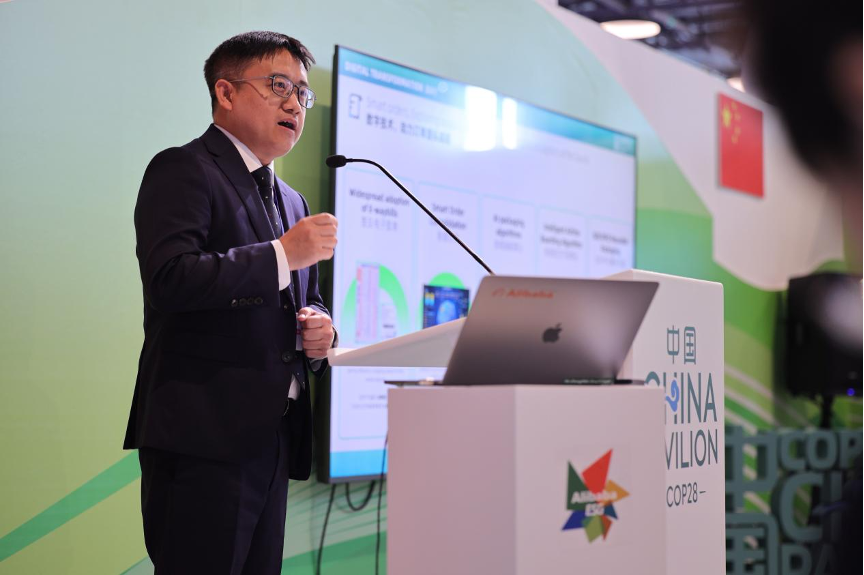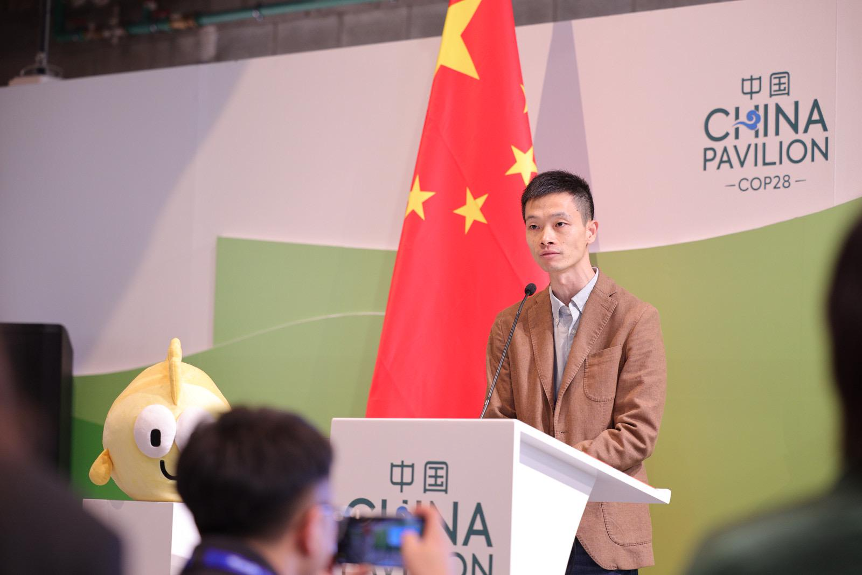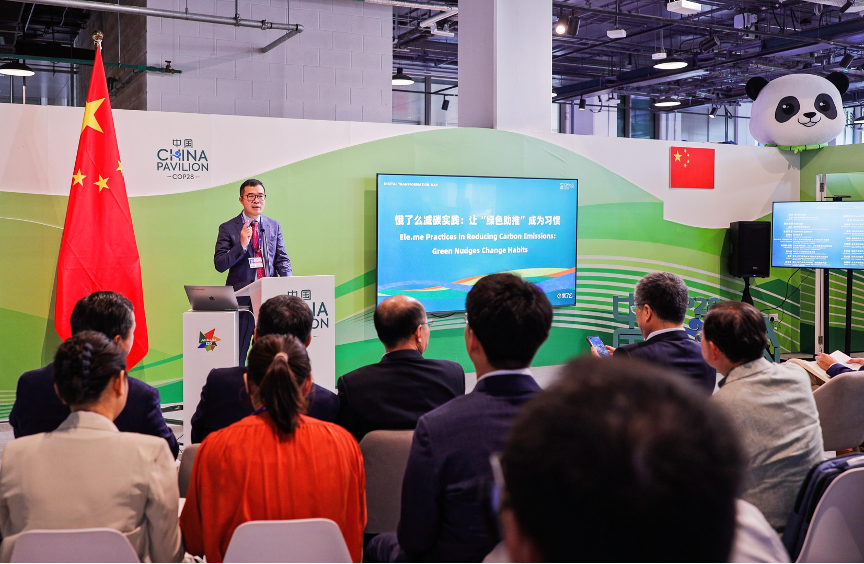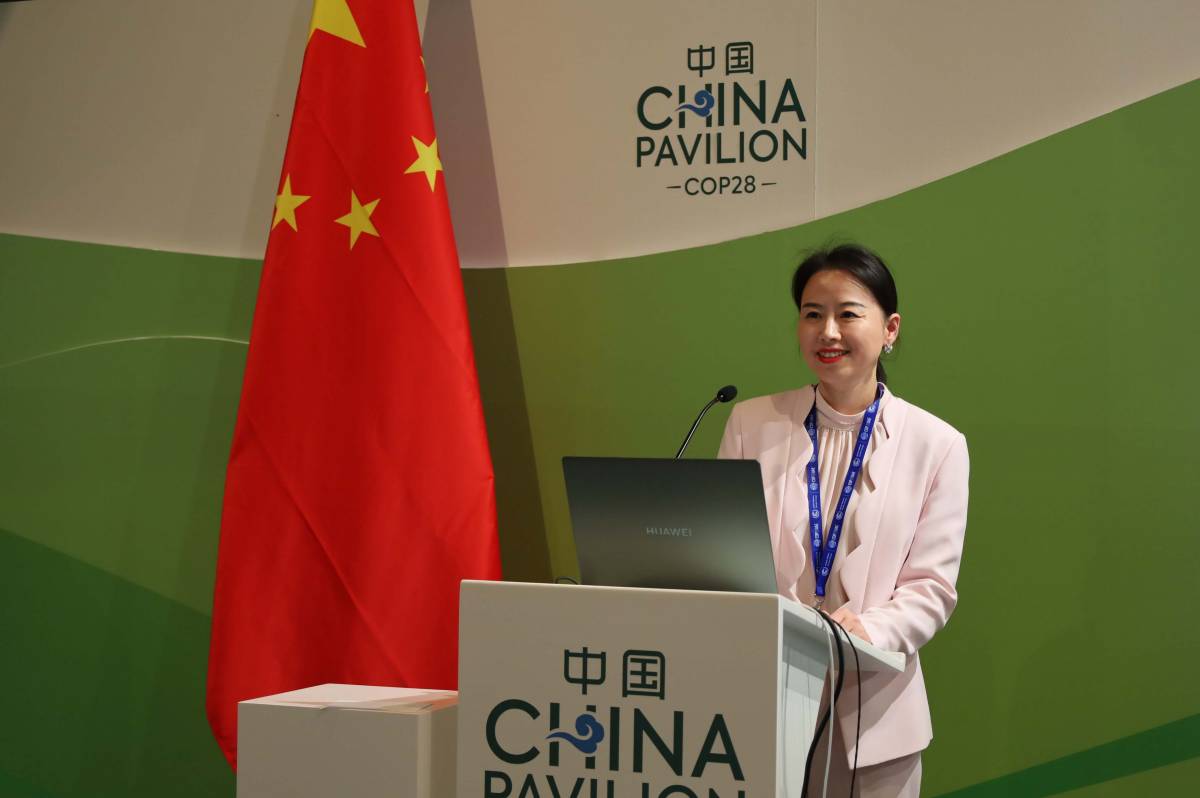Alibaba Businesses Share Green Initiatives at COP28
Published 12-18-23
Submitted by Alibaba Group

- Cainiao’s AI-powered logistics tool cuts packing materials by 15%
- Delivery service Ele.me targets plastic and food waste with in-app prompts
Alibaba Group’s ecosystem sits at the crossroads of digitalization and sustainability, and its businesses are leveraging the former to drive the latter, executives shared on the sidelines of COP28 in Dubai.
The 28th Conference of the Parties to the United Nations Framework Convention on Climate Change, also known as COP28, concluded on Dec. 12 after two weeks of discussions between global policymakers on growing sustainability efforts.
The event offered a learning opportunity for Alibaba, according to the group’s Chief Financial Officer Toby Xu, who attended the conference.
Xu is also the Chairman of Alibaba’s Sustainability Management Committee and in a statement, he said that the platform company is just starting on its journey to address climate change.
Different businesses are tackling the challenge in different ways, though all empowered by technology as advanced as AI and as simple as in-app notifications. Explore their innovations below.

Ship Green
During a side event at the China Pavilion, Cainiao Group’s Vice President Niu Zhijing, who is also the company’s ESG General Manager, expounded on the value of green logistics, which are “a long-term strategy of Cainiao,” he said in a statement.
The company is leveraging many types of technology to implement this strategy, like using AI to create a smart boxing algorithm. This tool selects the optimal parcel size for orders and reduces packing material use by 15%, according to Alibaba’s 2022 ESG report, slashing 80 million cartons worth of material from entering circulation each year.
Cainiao’s adoption of electronic manifests, which list all the items in a shipment in a digital format, has saved over 400 billion paper manifests over the last three years, according to Niu.
The logistics service is also making it easier for other companies to cut carbon. Cainiao implants RFID chips into its suite of around 33,000 reusable boxes, which were used over 130,000 times in the year ending March 31, 2023, documents filed with Hong Kong’s bourse show.

Shop Wisely
There’s a reason “reuse” comes second in the sustainability maxim “reduce, reuse, recycle” – remaking an item into something entirely new is an energy-intensive process that can be avoided by matching pre-loved goods with new homes.
Enter Alibaba’s circular consumption platform Xianyu, which offers an online venue for over 500 million users to post used items for sale, especially clothing.
The fashion industry is responsible for 4% of global emissions, equal to all the greenhouse gases produced by France, Germany and the United Kingdom combined, according to data gathered by advocacy group Global Fashion Agenda.
Xianyu is working to bring this figure down. By using the platform instead of buying at stores, platform users cut 3.14 million tons of carbon emissions during the year ending March 31, 2023.
But that’s just the beginning, according to Xianyu President Ding Jiang, who took to the stage in Dubai.
“We expect that by 2030, Xianyu will serve more than 1 billion users and drive carbon emission reductions of more than 55 million tons,” Ding pledged during a COP28 side event on Dec. 10.

Serve Sustainably
Food delivery app Ele.me is at the forefront of efforts to curb plastic waste, which accounted for over 400 million metric tons of garbage worldwide in 2021.
The platform made headlines earlier this year by launching “nudges” to discourage the use of disposable cutlery. The in-app suggestions increased utensil-free food deliveries by 648% versus a control group, according to a study published in September in Science magazine.
Ele.me has delivered over 1.7 billion orders without tableware, Senior Vice President Xiao Shuixian said during a COP28 side event, just one of several “low-carbon habits” the platform is encouraging among users.
Other efforts include offering smaller portions and group ordering in business districts to streamline delivery logistics.
However, these initiatives require industry-wide cooperation to create lasting impact. And so, Ele.me has joined forces with the China Environmental Protection Federation to release standardized carbon calculations for food waste reduction.
Going forward, the business will move towards paperless receipts, bamboo-based takeout packages instead of plastic and other low-carbon products, Xiao noted.
Farming For The Future
Farmers facing the consequences of climate change, from droughts to hail storms, have found a friend in tech-powered grocery chain Freshippo.
The platform showcased how it is helping to protect harvests from increasingly unpredictable weather patterns, which can cause devastating losses for the agriculture industry.
In desert-bound Inner Mongolia, Freshippo opened a pumpkin farm to hold back the encroaching sands and combat soil erosion last year.
More recently, the business developed a carbon-neutral honey production site in a village in Yunnan, employing local farmers who would otherwise need to eke a living from destructive rubber planting practices.
“Agriculture will continue to be heavily impacted by climate change, making it the common mission of global agriculture practitioners to address climate resilience in agriculture,” said Shen Li, co-founder and Freshippo’s head of sustainable development.
Separately, Eric Wan, Vice President of Alibaba Cloud Intelligence International and General Manager of Alibaba Cloud Middle East, Turkey & Africa, also spoke at COP28, highlighting how Alibaba Cloud’s data centres are leveraging cutting-edge digital technology to support its own decarbonization and empowering more businesses to do the same.
“We believe we can effectively use digital technology for good purposes and create a sustainable world powered by technology,” said Wan.
This article was updated to include mention of Alibaba Cloud’s presence at COP28
Please refer to https://www.alizila.com/esg/ for additional information about Alibaba’s sustainability efforts.

Alibaba Group
Alibaba Group
About Alibaba Group
Alibaba Group’s mission is to make it easy to do business anywhere. The company aims to build the future infrastructure of commerce. It envisions that its customers will meet, work and live at Alibaba, and that it will be a good company that lasts for 102 years.
More from Alibaba Group

